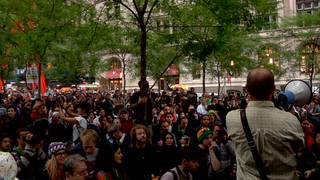
Guests
- James Steelecontributing editor at Vanity Fair. Steele and his reporting partner Donald Barlett have won virtually every major national journalism award, including two Pulitzer Prizes and two National Magazine Awards. Their latest book is The Betrayal of the American Dream.
- Donald Barlettcontributing editor at Vanity Fair. Barlett and his reporting partner James Steele have won virtually every major national journalism award, including two Pulitzer Prizes and two National Magazine Awards. Their latest book is The Betrayal of the American Dream.
In part two of our interview with the investigative duo James Steele and Don Barlett, they talk about the media’s failure to hold Wall Street or politicians accountable for financial crimes and mismanagement — topics covered in their new book, The Betrayal of the American Dream. They also discuss attacks on Social Security and campaign finance reform. Click here to listen to part one of this interview.
AMY GOODMAN: Our guests are James Steele and Don Barlett. They are the twice Pulitzer Prize-winning team who wrote America: What Went Wrong?, now their book, out this week, The Betrayal of the American Dream, the investigative reporting dynamic duo. What about the media and the role that it has played in all of this, Don Barlett?
DONALD BARLETT: Well, it’s really sad now, because, as you well know, print journalism is barely hanging on by its fingernails. Most people, even before this, still got their news from commercial TV news, which is probably the worst sort of news out there, news source. And it’s especially true with the cable news programs, because they’re basically selling their product. And if you look at CNBC, and I—you know, I barely can watch five minutes of it, and—because I know what’s going on over here, and I hear what they’re saying here, and the ordinary person doesn’t know this. They do not know that they’re buying snake oil.
JAMES STEELE: Too much of the time, especially television, a lot of commercial television, presents an issue that there are two sides to this issue. Now, of course, theoretically, there’s two sides to every issue. But let’s just take the issue of taxes. I mean, poll after poll after poll shows that the American people, overall, think wealthy people should pay more. And if you think about the way this country ran for a long time, that’s the way it ran, and it ran pretty well, for a part of that time. But yet, this is presented often as a debate as to what would be good, whether or not this would affect entrepreneurs, small businessmen, things of that sort—ridiculous arguments that most of these tax increases would not impact at all. But it’s presented like it’s a balanced two-sided argument. That’s the big problem with so much, especially the television media, when in fact that’s not what it is. You know, there are two sides to many questions, but the fact is, the statistics, the data, particularly on an issue of taxes, show quite clearly who benefits.
One of the most popular things that you’ll see, that George W. Bush used to talk about, how all Americans are stockholders and everybody owns shares of stock—one of the most misleading things of all. While it’s true many, many people, probably 50 percent, own some stock through retirement plans, when you look at tax return data, the dividends go to a tiny percentage of the American population, and they are overwhelmingly the richest Americans. So, who owns the stock? Well, maybe theoretically 50 percent of the population owns at least one share. The bulk is concentrated in a tiny number of people, even just part of that 1 percent. But that—but it’s presented very often in the media like as this—well, a lot of Americans own stock. But the ones who really own stock are really a tiny sliver, and that, very often, is never pointed out.
DONALD BARLETT: And then there are things that really that the average person just does not know and is not told by the media. One of the classics is there’s whatever it is now, $2 trillion or what, sitting offshore in foreign bank accounts that belongs to corporate America. And corporate America, in this case, are the multinational corporations. And they’re saying, “We’re not bringing that money back, because we have to pay taxes on it.” Here’s what people don’t know. They’ve already taken the benefit of the tax deduction to get that $2 trillion, and that came out of the pockets of middle-class Americans, because they didn’t pay what they were supposed to pay.
AMY GOODMAN: What about Romney owning, you know, having these bank accounts in the Cayman Islands and Switzerland?
DONALD BARLETT: Well, he’s doing just what everybody else in his income class is doing. That’s all. I mean, that’s why they don’t pay taxes.
JAMES STEELE: You know, and we’ve actually written about offshore stuff, off and on, for many, many years. And the few times where the U.S. has really tried to get tough in that area, theoretically tried to get tough, the campaign loses its zip very quickly, because there are so many interests out there that really don’t want that to happen. Not just the—
AMY GOODMAN: Who would be giving you money if you were running for office.
JAMES STEELE: Who would be giving you money if you were running for office. And the explanation is it’s a global economy. You have your accounts various places. But all of that’s basically malarkey, you know. And it goes to the heart of the argument that a lot of these people have about what’s happening in this country. A lot of people think that what’s happening to jobs and that sort of thing is just sort of inevitable, because we’re suddenly part of this bigger world, and we’ve got to be part of it, we can’t put up walls around the country. But that’s not really what’s going on. I mean, this isn’t just something that’s like a typhoon that happened, some bit of nature. This is policy that has allowed this to happen. And when it did happen, we could have easily taken steps to insist that that money be taxed. But we haven’t. And every time—
AMY GOODMAN: Let’s—
DONALD BARLETT: And the same thing goes—applies to trade. I mean, it is amazing that this country will go to war at the drop of a hat. “Give me another war.” I mean, we’ve been at war for 10 years. No problem. But suggest something that might, might have some impact on trade? “Oh, you’re going to start a trade war.” You know it’s a war that nobody would die in, and maybe some good might come out of it. But it would not be good for the people sitting up here.
AMY GOODMAN: We’re talking to Don Barlett and James Steele. Their latest book is The Betrayal of the American Dream. What about the role of the Democrats? Often what you get on the networks is the big debate between the Republicans and the Democrats. But when the division is almost nil, that’s when you get this unanimity—and so often it is.
JAMES STEELE: Right, and on most issues, both parties unfortunately have been very, very similar. The only significant difference—like on trade, for example, the Democrats have been sort of equally to blame for a lot of the trade policies that have gotten us nowhere. Same with deregulation. Both sides of the aisle supported that. The only area where you really do see some division is on taxes. The Democrats are closer to what we think is a decent policy, because a little of it at least harkens back to the policies that we had in this country for a long time. I mean, the fact that they are debating right now, and the Republicans are saying, “This would be terrible for this country if we let these Bush-era tax cuts expire.” I mean, this is just ridiculous. It’s completely ridiculous.
AMY GOODMAN: Explain why you think it is.
JAMES STEELE: Because even—because even expiring the tax rate of the wealthiest Americans, even if this expired, would not be anything like what their tax rates were in the early '70s, ’60s, let alone the ’50s. So even expiring, they're still going to be paying taxes at a lower rate than almost at any time in American history.
AMY GOODMAN: And, of course, the argument you hear on television constantly is, instead, they would be using that money to create jobs.
JAMES STEELE: Create jobs. I mean, I guess maybe their fourth house that some of them own, they would get a lawn service or something like that. Or—
AMY GOODMAN: But explain why that isn’t true and why that isn’t the way to invest in jobs.
JAMES STEELE: The way to invest in jobs is to have a certain amount of money in the public sector. I mean, that’s our belief. It’s not just infrastructure. It’s a whole series of things like that. And you also create a more equitable society. I think that’s the main thing. Inequality is at an all-time high in this country. And the reason for it, as much as anything, is the tax code, because folks at the top have far more money to spend than they ever did. I mean, the tax cuts in the 2000 decade, most of the estimates say $700 billion was—the rich did not have to pay. And that went straight into the deficit. And now people at the top, who fund a lot of these think tanks, they want to cut Social Security, Medicare, other benefits like that, because they say the deficit is out of control. Well, one of the reasons we have the deficit is because of the tax cuts.
DONALD BARLETT: It’s because they created the deficit.
AMY GOODMAN: Why is it in the interests of the economic elite to dramatically lower Social Security?
DONALD BARLETT: Well, that’s more money that’s available for the pie at the top. You know the most—we often get asked, “What did you really learn this time?” Well, the one thing we learned which blew us away was that it was a hedge fund guy who developed the thesis of—that the United States is really now a plutocracy. It is no longer a democracy. It is a government of, by and for the rich. We said, “Well, OK.” Except he marshals all of this data that makes his point coming from traditional business publications. Advertising Age, hardly the, you know, the left-wing—the polar of the left-wing thought, has dismissed the middle class.
JAMES STEELE: The market is the top, and forget everybody else. That’s what they’re saying. Those are the people who are going to buy things. Don’t worry about 90 percent of the people.
DONALD BARLETT: Exactly. And from the standpoint of the people at the top, they’re looking around the world: the middle class in China dwarfs this middle class, so we don’t care about the U.S. middle class anymore, because they’re not important; we really don’t want them. And this is what this election should be about, that some of these politicians—and a majority of the politicians—have decided the middle class in the United States is meaningless. We will need to concentrate on the middle class in China—
JAMES STEELE: India, right.
DONALD BARLETT: —in India and in Brazil. And forget about the middle class in America, because they’re toast.
JAMES STEELE: You know, the point you ask about Social Security and Medicare, the reason they want to cut those things, it all gets back to the federal Treasury. They want their taxes as low as possible. So if there’s any possibility they might have to supplement some of these programs with more of their tax money, they don’t like that. It’s as simple as that. So that’s the whole drive for that.
Now, we don’t dispute the fact that Social Security, probably at some point you’ve got to increase the age limit. That’s not what we’re talking about. I mean, we are living longer, and they’ve already started that process. But it gets much deeper than that. You’re talking about benefits, Medicare. You’re also talking about other benefits. So, what we’re saying is their whole thrust is to try to keep things—keep all federal expenditures down, because they think some of that comes out of their pocket.
DONALD BARLETT: And at the same time—
AMY GOODMAN: Last question on campaign finance, by the way.
DONALD BARLETT: And at the same time, they’re making this—you know, we’ve got to keep these expenditures down; especially look at what’s going on with Medicare. That’s with one hand. With the other hand, they are funding all—they are pushing all kinds of Medicare programs that they sell, that becomes revenue for them.
AMY GOODMAN: So they’ll use their own—they’re saying, “Why should I get Social Security?” they will say. Why should they get Social Security? Because they’ll show, you know, we have so—we make so much money.
JAMES STEELE: Right.
DONALD BARLETT: Yeah.
AMY GOODMAN: So they’ll then—
JAMES STEELE: You know, they forget like more than half the country, Social Security is their principal retirement benefit.
AMY GOODMAN: Thirty seconds. Campaign finance, what would that mean?
JAMES STEELE: Well, campaign finance remains, as it has for years and years, such a crucial issue. And obviously the Supreme Court ruling, Citizens United, has completely complicated that and made that much more onerous. And in fact, there’s a whole movement out there, as I’m sure you know about, for a constitutional amendment to change that, because supposedly—if you have a Supreme Court ruling this way. But obviously, if you had a Supreme Court that would rule differently, that would be a help. And that it remains so important—and I don’t know what we’d do until we really do change that.
AMY GOODMAN: We’re going to have to leave it there. I want to thank you both, Jim Steele, Don Barlett, not only for coming here today, but for this incredible book, The Betrayal of the American Dream, and for all of your work, the two-time Pulitzer Prize-winning investigative journalism duo, won the National Magazine Award twice, currently contributors to Vanity Fair. We thank you so much for being with us.











Media Options